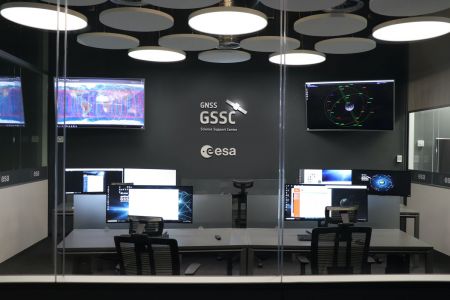If you wish to contribute or participate in the discussions about articles you are invited to contact the Editor
GSSC
| Fundamentals | |
|---|---|
| Title | GSSC |
| Edited by | GMV |
| Level | Basic |
| Year of Publication | 2021 |
The GNSS Science Support Centre (GSSC) is a joint initiative of ESA’s Navigation and Science Directorates and a facility of part of their joint Navigation Science Office. The GSSC, hosted at the European Space Astronomy Centre near Madrid, integrates a wide range of GNSS assets including data, products and processing tools in a single environment promoting scientific collaboration and innovative research.
History
The Navigation Science Office was set up in 2016 as a joint initiative between ESA’s Navigation and Science Directorates, coordinating scientific opportunities through interaction with the scientific community and ESA’s independent GNSS Science Advisory Committee. Since the conception of the Navigation Science Office, the set-up of a dedicated facility, the GNSS Science Support Centre, supporting the implementation of its strategy lines, was considered a key objective. Announced in October 2017 at the 6th International Colloquium on Scientific and Fundamental Aspects of GNSS/Galileo, GSSC integrates IT and GNSS infrastructure to deliver advanced data and processing services for the scientific community. In July 2018, GSSC initiated Pre-Operations providing a meeting point where the science community would be able to engage in activities carried out by the office such us:
- GBIGDATA - GNSS BIG DATA processing for monitoring, assessment of innovative techniques and science;
- GCROWD - GNSS CROWD sourcing applications for science;
- GESTA - GNSS Experiment for Scientific Tests in Antarctica;
- GREAT - GNSS General RElAtivity ExperimenT;
- GSSC Pilot - GNSS Science Thematic Exploitation Platform;
- WMCROWD - Weather Monitoring based on collaborative CROWDsourcing;
- NAVIPEDIA - NAVIgation WikiPEDIA;
All these activities have steadily contributed to GSSC in the form of data, products and analysis tools for GNSS Science. In December 2018, GSSC moved into Operations, confirming ESA’s concrete answer to the need expressed by the scientific community for a "one-stop-shop" for long-term GNSS data, products, results of scientific experiments and analysis tools to enhance GNSS scientific research and collaboration.
Mission
GSSC supports adequate exploitation of the navigation systems infrastructure as a unique tool for scientific research. In addition, GSSC supports information exchange across the scientific community and ESA GNSS Teams. Hence, GSSC aims at fostering the consolidation of a world-wide reference for the GNSS Scientific Community, maximising possibilities to perform GNSS Science activities and utilisation of European GNSS Infrastructures (Galileo & EGNOS). The GSSC facility includes all the technological infrastructure required to efficiently provide GNSS data services, operational services with advanced archiving systems, scientific receivers data, GNSS data processors, training/education tools and access to ESA member states experts.
GSSC's Thematic Exploitation Platform
The core of the GSSC Project is a large GNSS repository, including global providers namely the International GNSS Service (IGS), regional ground-based GNSS receiver networks, space-based GNSS receivers from multiple missions and data from other services that can be of scientific use, such as laser ranging data from the International Laser Ranging Service (ILRS). Since the start of operations in 2018, GSSC developments have leveraged on mainstream Big Data, Cloud, Virtualisation and Container technologies to implement the GSSC's Thematic Exploitation Platform. This platform evolves GSSC's repository with state-of-the-art discovery and analysis services to enable a paradigm shift characterised by moving the processing components closer to the data. GSSC cyber-infrastructure allows the scientific community to extend processing systems executed at Data Centres, like quality checks and product generation, with new ones like Jupyter Notebooks to carry out on-the-fly, interactive, data analysis without the need to download the data.
Future and Evolution
GSSC is to play a key role in ESA efforts to ensure long term access to GNSS scientific resources produced by ESA throughout the different research programmes, among which, for example, the innovative GNSS Intermediate Frequency Recording Station (GIFRES), which assesses feasibility of storing receiver's Intermediate Frequency (Big) data. GSSC's Thematic Exploitation Platform (currently in the Private Beta phase) will be available to the public, extending community involvement for increased feedback and validation purposes. As soon as the feedback from users is injected into the final version and testing is complete, the Beta version will be declared production-ready. GSSC will continue integrating outputs from GNSS projects such as:
- CAMALIOT - Application of Machine Learning Technology For GNSS IoT Data Fusion;
- GNSS Big Data - GNSS Big Data Processing for Monitoring, Assessment of Innovative Techniques and Science;
- UbiSAP - Ubiquitous Science Analytics Platform for IoT;
- Relativistic Positioning System - Study of the use of Intersatellite links in the definition of an autonomous system as part of the implementation of a Relativistic Positioning System;
- LIFELINE - Study on the feasibility and benefits of using a Relativistic Positioning System;
- A distributed network of Gamma-ray Burst detectors on Galileo;
- GASTON - Galileo Survey of Transient Objects Network (dark matter search);
- General Relativistic Effects in the orbits of Galileo Satellites;
- Requirements Definition Study for a Measurement of the Gravitomagnetic Clock Effect.
The GSSC is also expected to provide a major support to the scientific operations of all future GNSS-dedicated science missions on which ESA may be involved.
Related Links
For further information, please refer to the following links: https://gssc.esa.int/ https://gssc.esa.int/news/gsscs-new-beginning-gnss-thematic-exploitation-platform/

